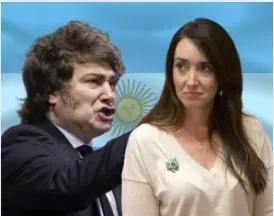This week, Vice President **Victoria Villarruel** was involved in a strong confrontation with President Javier Milei. The tension exploded when she allowed a session in the Senate where laws promoted by the opposition were approved, **such as the increase in pensions and funds for the provinces**. **Milei accused her of "treason"** and spoke of an **attempt at an "institutional coup."**
The session took place in the early hours of Thursday, with a majority against the government. There, a **7.2% increase in pensions** was voted on, along with a bonus for people with disabilities and more funds for the provinces. These measures **go against the adjustment and savings plan** that the president defends.
Upon learning of this, **Milei reacted on social media**, very upset, directly attacking Villarruel, calling her **"traitor."** The Vice President did not remain silent: she accused him of being **rude**, **childish**, and of not understanding the real problems of the country because he lives **"isolated in a palace."** She also stated that if he wants to save money, he should start with government spending on travel and intelligence services.
But this conflict **is not an isolated case in Argentine politics.** Throughout history, there have been several public confrontations between presidents and their vice presidents.
In 2000, then Vice President **Carlos "Chacho" Álvarez** resigned after denouncing corruption and distinguishing himself from President **Fernando De la Rúa**, which severely weakened the government of the Alliance. In 2008, Vice President **Julio Cobos**, under the mandate of **Cristina Fernández de Kirchner**, voted against the mobile retentions project in the Senate, politically breaking with the Executive. More recently, during the government of **Alberto Fernández**, there were strong tensions with his vice, **Cristina Kirchner**, especially regarding economic and management decisions, which became evident in public letters and indirect messages.
This conflict makes it clear that **the relationship between them is broken.** As early as December, there were signs of distance, but now it has become public and direct.
The confrontation between **Milei and Villarruel** marks a strong **crisis within the government itself.** While the president remains firm with his economic plan, the vice president is moving closer to social and provincial issues. Just a few months before the **October elections**, this internal fight could **change the course of the country** and weaken the government's image.

Comments